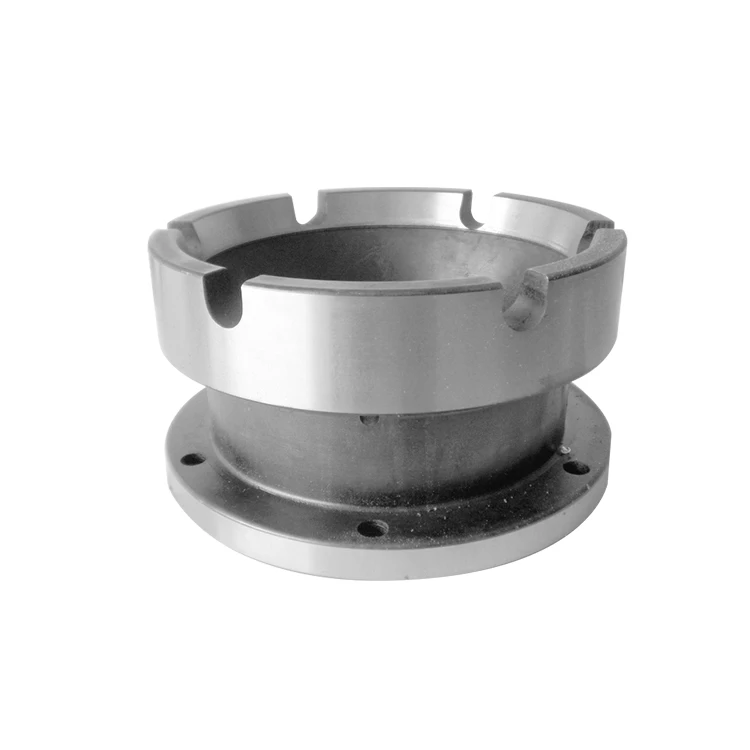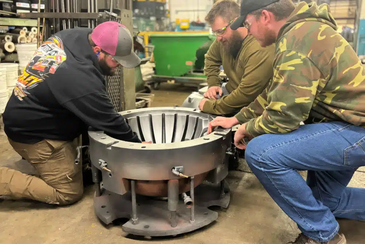The advantages of working with an expert Aluminum Casting Company
Exactly How Factory Provider Enhance Manufacturing Efficiency and Top Quality in Industrial Applications
Factory services play an important role in improving manufacturing performance and top quality across numerous industrial applications. By implementing sophisticated metal spreading techniques, these services assure elements are made with accuracy and uniformity. This not just lowers preparations but also lessens waste, promoting better partnership in between manufacturers and foundries. The influence of premium parts on operational performance increases crucial concerns about the future of commercial production. What technologies exist ahead in this developing landscape?
The Function of Factory Services in Streamlining Manufacturing Processes

Factories commonly offer experience in alloy development, making it possible for producers to make use of advanced materials that enhance product performance. The partnership in between factories and manufacturers promotes a much better understanding of manufacturing needs, causing maximized processes and enhanced item styles. By leveraging foundry solutions, suppliers can attain greater versatility, adjust to transforming market needs, and keep competition in the industry. Overall, the role of shop solutions is necessary in facilitating a more reliable and affordable manufacturing landscape.
Advanced Technologies in Foundry Procedures
Ingenious technologies are changing shop operations, markedly improving productivity and precision. Automation plays a crucial duty, with robotic systems improving recurring jobs such as molding and product handling. In addition, advancements in computer-aided layout (CAD) and computer-aided manufacturing (WEBCAM) systems allow foundries to develop complex geometries with greater accuracy and reduced material waste.
Furthermore, the integration of man-made intelligence (AI) and machine knowing enhances quality assurance by keeping an eye on procedures in real-time and forecasting potential flaws before they happen. Using innovative products, such as lightweight alloys and compounds, better enhances the efficiency qualities of actors items.
3D printing innovation is transforming prototyping and tooling, allowing for rapid personalization and reduced lead times. Collectively, these advanced technologies not just raise manufacturing efficiency but likewise assure that the end products fulfill stringent high quality requirements, placing factories at the leading edge of contemporary commercial applications.
Lowering Lead Times Via Reliable Foundry Practices
Efficient factory practices play an important role in decreasing lead times within production environments. By executing structured manufacturing processes and advanced scheduling strategies, makers can boost workflow and maximize resource allotment. These renovations not just increase output but also contribute to total functional efficiency.
Structured Production Procedures
Enhancing production procedures is essential for decreasing lead times in the manufacturing market. Reliable foundry techniques, consisting of optimized workflows and resource management, play a vital duty in attaining this objective. By minimizing waste and enhancing communication amongst groups, shops can considerably boost their operational effectiveness. The execution of standard treatments also adds to constant high quality and faster turn-around times, allowing manufacturers to respond even more swiftly to market demands. Additionally, the combination of advanced technologies, such as automation and real-time surveillance systems, aids in determining bottlenecks and helping with timely treatments. Overall, a concentrate on streamlined manufacturing processes not only increases preparations but also boosts the general competition of industrial applications, guaranteeing that products satisfy consumer expectations successfully.
Advanced Organizing Techniques
Reliable production procedures naturally lead suppliers to check out sophisticated scheduling strategies as a method to further decrease lead times. By utilizing sophisticated algorithms and software, browse this site shops can maximize process, lining up production timetables with need projections and source accessibility. Methods such as Just-In-Time (JIT) organizing decrease stock costs while making sure timely product distribution, thus boosting operational efficiency. Furthermore, incorporating real-time information analytics allows shops to anticipate potential delays and adjust routines proactively. This adaptability not just streamlines procedures however also enhances general efficiency. In addition, collaborative planning with clients and vendors can foster a much more synchronized supply chain, further reducing preparations. Eventually, these innovative scheduling strategies encourage shops to accomplish greater performance and superior high quality in their production procedures.
Making Sure Precision and Quality in Metal Spreading
Guaranteeing precision and top quality in steel casting calls for a precise method that incorporates every stage of the production procedure. This process starts with careful design and engineering of the mold and mildews, guaranteeing they can hold up against the molten metal's temperature level and stress. The selection of high-grade raw materials is essential, as contaminations can compromise the last product.
As soon as the products are prepared, specific temperature control throughout melting and putting is basic to attain the desired residential or commercial properties in the cast metal. Keeping track of solidification and cooling prices more warranties dimensional accuracy and surface area coating.
Quality control methods, such as non-destructive testing and inspection, are essential to recognizing issues early in the procedure. Precision aluminum casting. Furthermore, employing proficient personnel who understand the subtleties of steel spreading adds significantly to preserving high requirements. On the whole, these methods collectively improve the reliability and efficiency of cast components in different commercial applications
Lessening Waste and Maximizing Source Use

In addition, recycling scrap metal within the shop itself can significantly reduce waste, transforming spin-offs into usable resources. Lean manufacturing principles additionally add to lose decrease by enhancing procedures and removing unnecessary steps, leading to extra efficient operations.
In addition, regular maintenance see of devices warranties peak efficiency, stopping failures that can result in wasted materials. By concentrating on these methods, shops not only decrease prices yet additionally add to sustainable methods, straightening with the growing demand for eco accountable production methods in commercial applications.
The Competitive Advantage of High-Quality Elements on the market
Premium components offer a considerable affordable advantage in the foundry market, where precision and sturdiness are vital. Manufacturers that prioritize superior products and workmanship can enhance product performance and integrity, resulting in increased consumer satisfaction. This benefit is specifically evident in sectors such as vehicle and aerospace, where component failing can have devastating effects.
Furthermore, top quality components frequently cause reduced upkeep costs and prolonged product life-spans, which can be attractive selling points for possible customers. As market demands grow for lasting and effective technologies, the emphasis on high quality becomes much more crucial. Companies that invest in premium foundry solutions not only improve their manufacturing procedures however likewise separate themselves from rivals who may sacrifice quality for price financial savings. The commitment to high-grade parts inevitably equates right into a more powerful market placement and long-term organization success.
Frequently Asked Questions
What Kinds of Products Do Shop Provider Typically Deal With?
Shop services typically function with metals such as light weight aluminum, steel, iron, and brass, along with various alloys. They also take care of materials like porcelains and compounds, dealing with varied industrial needs and requirements in manufacturing processes.
Exactly How Do Shop Solutions Impact Overall Supply Chain Management?
Shop services substantially enhance supply chain administration by simplifying material sourcing, reducing preparations, and guaranteeing consistent high quality. Their capacity to supply tailored options promotes partnership among stakeholders, inevitably improving overall operational performance and responsiveness in production.
What Industries Advantage A Lot Of From Shop Solutions?
Industries such as auto, consumer, aerospace, and construction products substantially benefit from shop services. These markets rely upon precision spreadings to satisfy rigid quality criteria and improve their total production procedures and product performance.
Are Shop Solutions Lasting and Eco-friendly?
Shop services can be ecologically pleasant and lasting, particularly when using advanced innovations and procedures - Precision aluminum casting. Technologies such as recycling materials, decreasing exhausts, and optimizing power usage add to reducing their eco-friendly effect in industrial applications

Just How Can Business Select the Right Foundry Company?
Business can select the best shop service company by assessing knowledge, production abilities, high quality accreditations, technology used, client reviews, and sustainability practices while ensuring alignment with their certain task demands and long-lasting company goals.
Factory solutions play a crucial duty in enhancing production performance and top quality throughout various commercial applications. The collaboration between suppliers and shops fosters a much better understanding of manufacturing needs, leading to maximized processes and enhanced item styles. Reliable foundry practices play a crucial function in minimizing lead times within production atmospheres. By employing sophisticated algorithms and software, factories can maximize operations, aligning production timetables with demand projections and resource accessibility. Firms that invest in top notch foundry solutions not just enhance their production processes yet also separate themselves from rivals who may compromise high quality for cost financial savings.